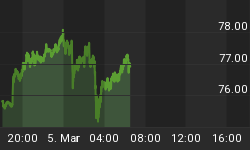Below is an excerpt from a commentary originally posted at www.speculative-investor.com on 8th October 2009.
The "Paradox of Thrift"
The "circular flow of income" theory favoured by Keynes and his disciples holds that one man's spending is another's income, the implication being that if consumer spending is boosted then economy-wide income will be boosted and the overall economy will strengthen. It follows from this theory that an economy-wide increase in savings will lead to a weaker economy, since the only way to increase savings is to reduce current spending. This is what the Keynesians refer to as the "paradox of thrift". In their minds a paradox exists because while it can be shown that an increase in savings will often be a good thing at an individual level, it causes problems if practiced throughout the economy.
But how can this really be so? After all, the economy is just a collection of individuals, so what makes sense on an individual basis should also make sense on an economy-wide basis. Shouldn't it?
Yes, it should and it does. The paradox of thrift only arises if you begin with the wrong premise. The wrong premise, in this instance, is the "circular flow of income" theory.
The flaw in the theory becomes apparent once it is understood that people don't really spend money; rather, they spend what they produce. Money is just the medium of exchange. For example, a baker spends bread, a shoemaker spends shoes, and a dentist spends the dental services that he provides to his clients. In each case the produced goods or services will be converted to money, but this is only done to make exchange more efficient. If not for money, a dentist that wanted bread would have to locate a baker that wanted his teeth cleaned in order for exchange to take place.
Once it is understood that each person spends what he/she produces it becomes clear that an increase in production must precede an increase in consumer spending.
Another way to look at it is that consumer spending involves taking something out of the economy. If people throughout the economy began taking more stuff out than they put in, how could the economy possibly grow?
Accepting that a sustainable increase in consumer spending must be preceded by increased production, we need to address the question: What causes production to increase?
In simple terms, a per-capita increase in production comes about due to investment in the factors of production*, and investment stems from savings. In other words, rather than a circle that has no beginning or end, the economic growth process begins with savings and investment. An increase in savings and investment leads to greater per-capita production, and the increased production creates greater demand for consumer goods. To the extent that they are successful, government policies that attempt to reduce savings and boost consumer spending will therefore lead to a weaker economy.
The upshot is that there is no "paradox of thrift".
*Factors of production are the resources employed to produce goods and services, including tools, equipment, land, factories, offices, technology, and labour (skills and education).
"Over-Production"
The same misguided thinking that comes up with the "paradox of thrift" also spawns the idea that economic downturns can be caused by, or exacerbated by, the general over-production of goods. But if production finances consumption, how can the economy ever suffer from general over-production?
The answer is that it can't.
Rather than general over-production, what happens is that monetary inflation distorts relative prices and prompts excessive investment in some parts of the economy. The initial effect is a boom in the parts of the economy that receive the excessive investment, but after a while -- due, perhaps, to a reduction in the rate of monetary "stimulus" -- it becomes apparent that many of the boom-time investments do not mesh with the desires or financial capabilities of consumers. We therefore don't end up with general "over-production"; we end up with an imbalanced economy where production is not well matched with consumption.
There have been many great examples of the above over the past few years. Of particular note, the inflationary policies of banks and governments prompted excessive (to put it mildly) investment in residential and commercial real estate, resulting in economies that were structured to build, fit-out, finance and market a lot more properties than were required to fulfill sustainable consumer demand.
We aren't offering a free trial subscription at this time, but free samples of our work (excerpts from our regular commentaries) can be viewed at: http://www.speculative-investor.com/new/freesamples.html.















